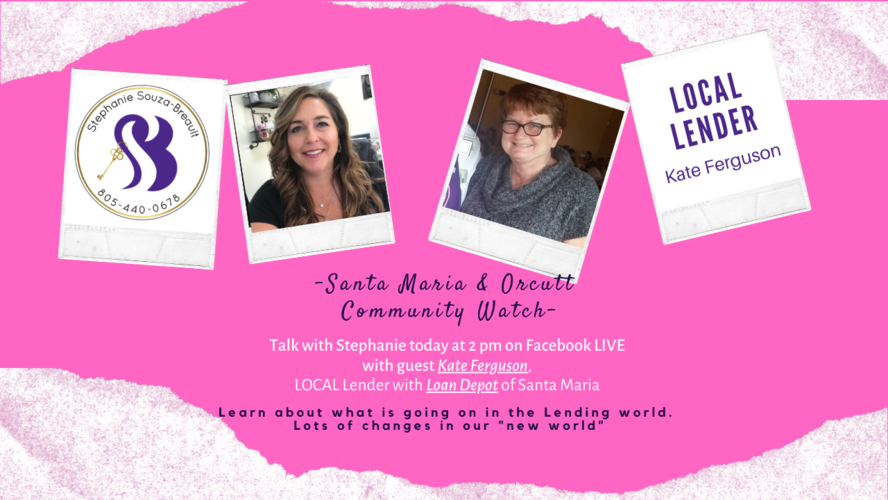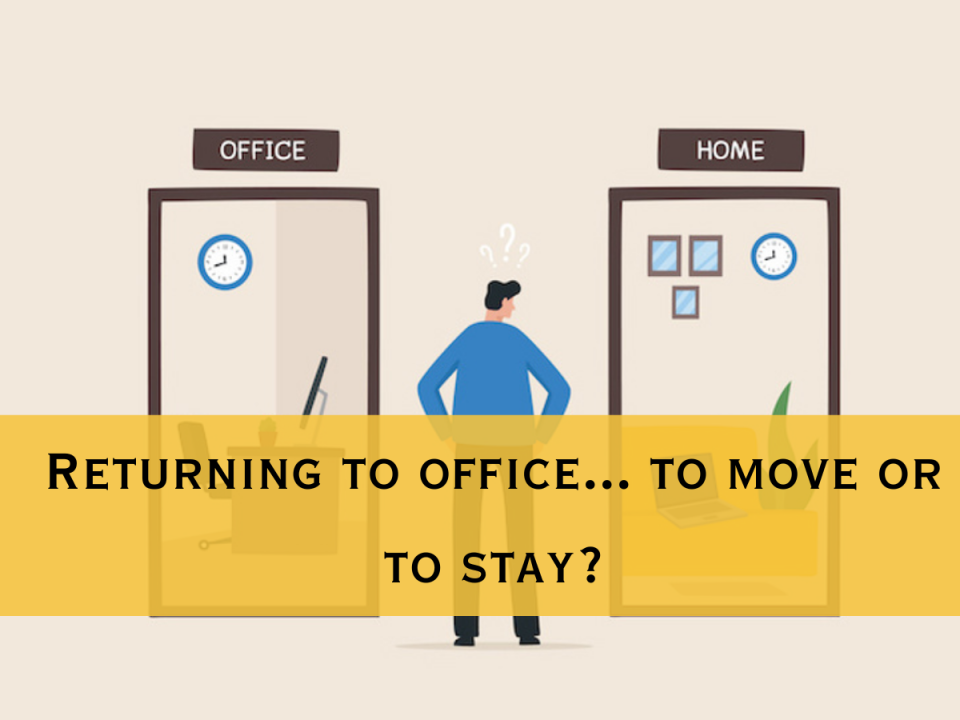Interview with Kate Ferguson a local lender with Loan Depot | Santa Maria, CA
Interview with Kate Ferguson a local lender with Loan Depot
Stephanie talks with a local lender, Kate Ferguson with Loan Depot on how the market is affecting the lending world. A lot has changed in the world since the beginning of the year! Programs that were once available, are no longer available and since March there has been a lot of changes in helping people get loans to purchase homes. It is not all doom and gloom, however there are changes to be aware of and having a local resource to guide you thru the maze is extremely helpful. Stephanie and Kate touch on some of the most asked questions and give some guidance on how to navigate the new waters we are all swimming in. Kate can be reached at 805-361-7203 or email: kferguson@loandepot.com
– I think it’s workin’, here we go. Okay, we finally got on. Had a little bit of technical difficulties, but we are here and we are on. And we are live with Kate Ferguson. She is a local lender that has been doing this for quite a long time. She Is with Loan Depot. And thank you, Kate, for joining us. And why don’t you just tell everybody a little bit about yourself and a little bit of the background.
– Thank you, Stephanie, for having me. I really appreciate it. I’ve been lending for, I don’t wanna give away my age, but over 40 years now. I tried to escape it once, but I decided, I learned it’s in my blood. It’s what I love. I just like helping people be able to get into their houses, save some money on the refinances. It’s just, I guess it’s who I am now, so. I’ve been in Santa Maria since 1980. Loan Depot moved into town about 11 years ago and I joined with them. I love the company. It’s privately-owned and very well-run, but it’s a very large company. When I say privately-owned, people think it’s small, but we are a large lender.
– Okay.
– Enough about me.
– Well, we’ve done some business together, Kate, and you’ve always held the customers’ hands, walked them through the entire process, which everybody really appreciates that, especially for first-time homebuyers as well. And, as I’m talking to different people and giving this information out to the community and, hopefully, giving some information that’s helpful, the COVID situation and the coronavirus has changed the way we are all working. How has that changed for you and how you’re doin’ business? Are you actually in the office or how has it changed for you?
– I’ve been working from home for a couple of years now off and on. Once the COVID thing started, I moved home full-time. I go in the office about once a week, if I need to, or if I need to meet a client. So, I mean, it really hasn’t changed much about how we’re doin’ business in general. We’ve gotten to the point now where so much of it’s technology. I mean, we’re doin’ applications online. We’re talkin’ to people by email and by text. That’s kind of sad when I get all the way to the closing and I haven’t met my client yet. I really miss the one-on-one contact, but it’s happening more and more often.
– Yeah, it’s definitely changed the way we’ve done business. And I had one that closed last week, and the first time I actually met the clients was when I actually met them to give them keys, which was a different way of doing it because it was during lockdown and we couldn’t actually meet. So, very interesting. Now, how has the COVID situation changed the restrictions for people that are qualifying, looking to purchase a home? Has that changed anything for them?
– It has to a degree. It’s made things a little tighter. Everything lenders do is risk-based. You know, the pricing is risk-based. The documentation rate we get is based on the risk. And things are just riskier now because of the job situations and those types of things. The only people that I’ve really seen an effect, though, are investors, people buying investment properties. It’s harder for them. They’re requiring more assets, more cash reserves. Credit scores have tightened up. And then the scary part for so many people is, am I gonna have a job when I’m done? And we do have to verify the day we close the loan that you are working and on the job. So far, I’ve been lucky. I’ve only had one person go out on leave since we started the loan, but we still think we’re gonna be able to close his loan in time because he’s expecting to go back to work if they don’t push back the restrictions.
– Okay.
– So that’s really about it. Some of the credit scores have tightened up a little bit and some reserves have tightened up.
– Touch on that a little bit for those out there that maybe have not been through a loan process before or they’re first-time homebuyers. What do you mean when you’re talking about reserves?
– Reserves are how much cash you’ve got left over after you pay everything you need to buy the house. Your down payment, your closing costs. We like to see that you have some money leftover because we all know, even if your buddies help you move, you still have to buy the pizza and the beer for them. And these days we’d really like to see two to three months cash reserves. Now that doesn’t have to be money in your bank. It can be your 401k, or it can be your retirement plan, just money that you can access in an emergency, just in case, like so many of those people who lost their jobs in the last eight weeks.
– Yes, absolutely. Now, I’ve had this experience, you and I have talked off-screen, but for those out there that have maybe been put on hold, their jobs have been put on hold, and they even have a letter from their employer saying that, soon as we open back up, you could come back to work. Does that count as actually havin’ a job? Or what is that, what counts for you in your work?
– They have to be back on the job. Fannie Mae and Freddie Mac came out with an update today, in fact. It was very timely, since I knew I was gonna be talking to you today, that said they must be on the job. A letter stating that they’ll be back doesn’t work. Now, we are not requiring a pay stub. I have heard of some companies actually requiring a pay stub. As long as we can verify that they are on the job.
– Okay.
– And that’s gonna usually entail a phone call. It could entail a written verification of employment. And then quite a few lenders these days, we can verify their employment online. If the employer subscribes to Workday payroll service, we can just verify it online. But they do have to be on the job the day we close.
– Okay. I know that’s affected some of my clients or, on the other end, the buyers coming in, so I wanted to touch on that.
– Yeah.
– And another question that people have, some people on the debt-to-income ratios. Those that have purchased a home have been down that road before. Can you kind of touch on what a debt-to-income ratio is, and has that changed in today’s world?
– The debt-to-income ratio is what your house payment, plus all your obligations. That’s car payments, bills, child support, alimony, credit cards, student loans, not your utilities and not your insurance. I guess they figure you can live without utilities or insurance, but you can’t live without your car payment. But all those numbers added together and divided by your gross income. That creates your debt-to-income ratio. The guideline, if you actually look in the guidelines, are pretty strict. Generally speaking, we go about 45% to 50% total debt-to-income. If the rest of the file is good, we can take it as far as 50%. If the rest of the file’s weak, we’re gonna have to stay closer to 45.
– Now has that changed in this world we’re living in now?
– FHA has tightened up a little bit on theirs. We could go 50, no doubt whatsoever. And I’ve had a couple of ’em kick back at me now. And everything is underwritten by an automated underwriter now. It’s a computer that makes the decision, which is frustrating to me, because I used to be the underwriter. I was the person who actually looked at the paperwork and determined, based on this paperwork. And, in my case, I was lucky. I got to meet the client, too. I could say, I think this is a good credit risk even if this number is skewed a little bit. Well, that’s changed now. And we all go purely on the automated underwriting system.
– Hmm, okay. Now here’s a thing, it’s not new. I mean, this came out right when we got on the shutdown, March 19th, forbearance has been a hot topic. I’ve seen lots of videos, lots of conversation about it. In our world, things were changing almost by the hour, it seems like, things are changing by the day. Is there anything on that you’d like to touch on? Or has anything changed on forbearance?
– The one thing I wanna make sure people know is forbearance is not forgiveness. That’s important to know. You hear, your buddies are telling you, well, you don’t need to make your payment and that’s not true. You borrowed money from us. You signed a note saying you promise to pay us back. We expect you to pay it back. Now, we understand that people have issues and problems. You know, you lost your job. You need to feed your family. You know, that’s important. But so, it’s very important to try to make your payment if you can. If for some reason you can’t, you need to call your lender. There is an 800 phone number on your mortgage statement. Call that number and talk to them, and see what their policies are. I can’t tell you what the policies are for anybody. I can’t even tell you what it is for us. Because, like I said, it is changing on an hourly basis as much as daily. So you do need to talk to your servicer and say, hey, this is my situation. They’re probably gonna ask when do you think you could get caught up, when do you think you’ll be back to work, those kind of questions. Be prepared to answer those. But anytime you’re gonna have a problem making a house payment, I don’t care if it’s during a COVID crisis or not, you always wanna call your lender immediately. Don’t think it’s gonna go away. Don’t hope it’s gonna go away. ‘Cause I promise you, it’s not. So, make those phone calls and say, hey, what can we do together?
– Okay. Yeah, don’t ignore it with them and work out a plan, yep. Now, are there any loans that were available pre-COVID that are just vanished into thin air? Are there any programs out there that just are no longer available now?
– Not vanished, but very hard to get and very expensive in the jumbo market. That’s, in Santa Barbara County, anything over $625,500 is considered jumbo, and there’s few and far between lenders that will do ’em. I only have, you know, before this started, I probably had 15 sources. Now I only have two, and the rate is very high. As I said earlier, everything we do is risk-based. Those loans are considered riskier because we’ve got so much invested in the property. So, your interest rate is gonna be higher and your fees are gonna be higher. Another product that we’re seeing less and less of is the down payment assistance programs. My company has chosen not to do ’em anymore at this point in time. The state of California still has a product out there. There are still a couple of lenders that are doing them, but less and less are doing them. Because those are extremely risky loans. Because, as I mentioned earlier, we wanna see you have some reserves going in. Well, if you’re going in at 105% loan-to-value, which means you’re borrowing all your down payment and your closing costs, you owe 5% more than the house is worth, that’s a high risk loan. And the chance of you having reserves is pretty darn slim at that point. And you know, so we’ve just chosen not to get into that boat right now. Hopefully, we’ll be back soon, but right now, we’re not doing ’em.
– Okay. Now I have a question for you that you might not be able to answer. I have clients, I have friends, I have people that I know that have been affected, that they’ve had a shutdown, whether it’s their hair salon or their gym, or what have you, and they were gearing up to purchase a loan. They were gearing up to work with a lender. Are they gonna have to wait for a significant amount of time once we get opened back up, to start the process of getting a loan? Do you know the answer to that? I’ve had quite a few questions on that lately.
– The self-employed borrower, you mean?
– Yes, yes.
– I don’t know how we’re gonna deal with that, to be honest. I think it’s gonna be, we’re gonna base the income off pre-COVID, of course, because that’s all we have to document, because we use tax returns. I have had one request so far from an underwriter for an explanation of how a borrower, why their job is gonna stay and how they think it’s gonna secure. I think that was a commissioned person, you know. So, self-employed is gonna be kinda like that. That’s gonna be a judgment call. I think, like your friend, the hairdresser, the manicurist, those guys, once the door’s opened, they’re gonna be fine. I’m not worried about them. Well, I’m not worried about them because I’m not afraid of the COVID. I guess some people still won’t be going back and seeing people. But I think they’re gonna be all right. And I, if I was underwriting, wouldn’t have a problem with it. But underwriting is an art, it’s not a science. Once we get away from the computer, and the computer’s gonna say, based on this income, yes, you’re okay. But it’s gonna take the underwriter to say, okay, is the information we put in the computer gonna be accurate based on what we know? And that’s gonna be a judgment call.
– So, basically, if they were gearing up to get a loan before this happened, once they get back to work, they should start doing the process again and just seeing how it fares, how it works out and if they’re able to move forward with the loan.
– I would highly recommend that.
– Okay.
– And I would put together, before I went back to the lender, a letter, we call ’em letters of explanation. I have also called ’em budget letters. You know, an explanation as to why I think this is gonna work. Kinda like their business plan when they, if they got a business loan, you know. Put together something like that, provide it to the underwriter, so you can show the underwriter. You’ve already thought about this. You’re not just jumping back in, you know?
– Yep. Well, Kate, I think you’ve provided a lot of information today. Thank you for taking the time. I know you’re really, really busy. I’d like to end, if at all possible, if you’d like to give a message of hope to the community.
– You know, let’s be honest. This has sucked the last few weeks. None of us are happy with it. But we will come out of this on the other end stronger, and we’ve learned a lot. I’ve been through quite a few of these mortgage crises. This was a little different because it’s health, not financial, but I know we will come out stronger. We’ll come out with better ideas. And, hopefully, we’ll come up with, I don’t think we’re gonna get a vaccine as soon as everybody else does, but, hopefully, we’ll come up with some treatments quickly so it’s not as scary as it is today.
– Yeah.
– Does that help?
– Yep. And it pushes everybody to embrace the technology. Look what we’re doing right now. You and I will have conversations, but we have never gone live and broadcasted out there to other people that might be wondering the same question, so.
– As you just discovered earlier, I’m learning technology as I go.
– You did fine, you did fine. Thank you so much for your time today. I really appreciate it, Kate.
– Thanks a lot, Stephanie. And go out there and buy a house. This is a great time to buy a house. Interest rates are great. We expect them to stay good. If you’re concerned about your debt load, talk to your lender about possibly doing a cash-out refinance and eliminating some of your debt load, because this is a good time to do it with rates as low as they are.
– Yeah, rates are amazingly low.
– These are the lowest rates I’ve ever seen in over 40 years, seriously. And, from everything I see, we don’t expect ’em to go away in the near future.
– They’re expecting ’em to stay low for the most part of the year. Isn’t that what you’re being told?
– Into next year.
– Yeah.
– We’re hearing, yeah.
– Okay. So get ahold of Kate and give me a call and we can get you in a house, right?
– Yep.
– All right, Kate, thank you very much.
– Take care, thanks, Stephanie.
– All right, bye bye.
– Bye bye.




